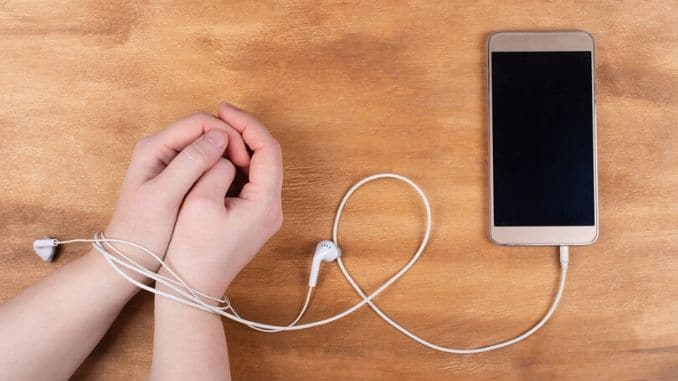
You carry it with you every day. You check it frequently. You use it to talk to others, to text, to email, to shop, to take photos, and more.
You might feel lost without it.
We’re talking about your cell phone. It’s the one thing you take with you pretty much everywhere. Most of the time, you only think about all the ways it helps your life.
But, what about the ways that it may damage your health?
Recent research shows that cell phones are not harmless. Depending on how you use them, they may increase your risk for several health issues, including those that affect your eyes, brain, neck, and overall body. They can even increase your risk of death.
You don’t have to give up your phone to live a healthy life, but it does help to become more aware of the dangers so you can take steps to protect yourself.
1. Increases Your Risk of Being in a Car Crash
The National Safety Council (NSC) found that cell phone-related car crashes continue to increase, and by 2015, accounted for 27 percent (over a quarter) of all crashes. The National Highway Traffic Safety Administration (NHTSA) states that distracted driving killed 3,166 people in 2017.
Take Action
Answering a text takes your attention away from the road for about five seconds. If you’re driving at 55 mph, that’s enough time to travel the length of a football field. When driving, keep your attention on the road. Use driving apps like On My Way (OMW), Lifesaver, and OneTap to block incoming messages while you’re behind the wheel.
2. Messes with Your Restorative Sleep
If you look at your phone within an hour or going to bed, or worse, keep it in your bedroom overnight, you’re most likely shortening your sleep duration. In a 2017 study of over 2,400 participants, scientists found that late-night cell phone use was associated with poor sleep quality.
In a 2016 study, longer average screen times while in bed were also associated with poor sleep quality decreased sleep efficiency, and more difficulty falling asleep.
Cell phones and other technological gadgets emit blue light, which stimulates the brain and decreases the production of melatonin, the sleep hormone. It can also disrupt your natural circadian rhythms, causing shorter REM cycles and overall restless sleep.
Sleep deprivation is linked with several health problems, including weight gain and obesity, type 2 diabetes, heart disease, cancer, and even premature death.
Take Action
Always keep cell phones, computers, tablets, and televisions out of the bedroom. Stop using your cell phone at least 90 minutes before bed, and allow your brain to wind down.
3. Exposes You to Dangerous Germs
When did you last clean your cell phone? You probably can’t remember. It’s not something most of us do often, but we should. The average person checks their phone 47 times per day, according to a survey by Deloitte, and that’s after cooking, cleaning, and even going to the bathroom.
Scientists at the University of Arizona found that cell phones carry 10 times more bacteria than most toilet seats. (Ew!) In a 2017 study, researchers found more than 17,000 bacterial gene copies on each of the 27 mobile phones studied.
Other studies have found potentially dangerous pathogens on cell phones, including Streptococcus, MRSA, and E. coli.
Take Action
Clean your phone once every couple of weeks. Mix a solution of 60 percent water and 40 percent rubbing alcohol, then dip a cloth in the solution and gently wipe it across your phone. Avoid liquid spray cleaners, which can cause damage.
4. Causes Text Neck—Which Can Lead to Spine Problems
Text neck is a relatively new term that’s used to identify the pain caused by constantly staring down at your phone. Dr. Dean Fishman first coined the term in 2018, after examining a teenage patient complaining of headaches and neck pain.
Every time you tilt your head forward to look down at your phone, you’re asking your muscles, ligaments, and tendons in the neck to work harder to hold your head. An adult head weighs about 10-12 pounds when in the neutral position, but when you tilt it forward, that weight increases with the angle, going up to 60 pounds at a 60-degree angle.
A good rule of thumb is that for every inch your head goes in front of your neck, you add 10 pounds of pressure on your spine.
In a 2014 study, researchers noted that tilting the head forward in this way worsens overall posture, increasing the weight on the spine and potentially causing long-term neck and upper back pain, as well as spinal disc and nerve damage.
Take Action
Lift your phone to eye level when using it, or use a cell phone stand so you can see it comfortably while sitting or standing. Also, consider limiting your time spent on your phone, and switch to larger gadgets that you can use more comfortably, such as tablets or computers.
5. Increases Your Risk of Stress, Anxiety, and Depression
Have you ever noticed after about 10-15 minutes of perusing your social media feed, you feel a little down?
Pay closer attention next time, because what you’re seeing on your phone could be affecting your mood. Researchers from the University of Illinois found that high engagement with cell phones was linked with anxiety and depression. Further, those who felt addicted to their phones were more likely to suffer negative emotions because of it.
It’s true that people typically put their best foot forward on social media. They post their best family pictures, vacation photos, and party shots, making it look like they’re living the ideal life. It’s easy to compare what we’re seeing with our own lives and feel like we’re coming up short.
Social media can also expose viewers to a heavy dose of negativity. In one study, researchers found that participants exposed to more negative posts were likely to post negative news themselves—showing that emotions connected with social media can be contagious.
It’s not only social media that causes the problem, though. The constant influx of information coming from our phones can lead to feelings of stress and anxiety as we become worried about what we’re seeing, or about missing out on something.
Take Action
Limit the time you spend on social media, and unfollow or unfriend those that are too negative. It also helps to make one day a week a “phone-free” day to give yourself a break.
6. Damages Your Eyesight
Scientists are learning more every day about how blue light from cell phones, computers, and tablets, affects our eyes. The news isn’t good.
In one study out of the University of Toledo, researchers found that blue light emitted by phones promoted the growth of “poisonous molecules” in the eyes, which could later lead to macular degeneration.
The retina, which is the light-sensitive tissue at the back of the eye, has no protection against damaging blue light. So your cell phone could damage that tissue, transforming molecules in the retina into “killer” cells. This study was not performed in human eyes, so we still need more research on the issue, but it does raise serious concerns.
Staring at any screen for a prolonged period can also cause eye strain or what eye doctors now call “computer vision syndrome.” This can lead to tired eyes, dry eyes, blurry vision, and headaches.
Take Action
Take a break from the screen every 20 minutes, and for at least 20 seconds, look at something that’s at least 20 feet away. Then try to remember to blink more often–it’s common to decrease the blink rate while concentrating on something on the screen.
Try a light-reducing app that helps reduce glare on the screen. Use the “nightshift” mode on your iPhone, or try f.lux on your computer. Check with your phone manufacturer to see if they have blue-light filters for your screen.
If you wear glasses, try Transitions Adaptive lenses—they can help filter out blue light from the screen and the sun.
7. Reduces Your Brain Power and Productivity
Cell phones enable and encourage constant connection to information, entertainment, and friends, and loved ones. Their persistent presence, though, along with the fact that they offer the constant capability of rewarding us with “likes” and messages, appears to create a “brain drain” that can undercut our thinking power.
In two experiments, researchers found that even when people managed to keep their attention on the task they were doing—avoiding the temptation to check their phones—just the mere presence of their devices reduced mental resources, affecting their cognitive capacity. In other words, even if your cell phone is set to silent and placed out of sight, its mere presence can reduce your working memory and problem-solving skills.
In another study, when the smartphone was on the desk, participants performed poorly on a concentration task. But with each increasing layer of distance—the phone in a pocket, locked in a drawer, or removed from the room—performance increased. Overall, the test results were 26 percent higher when the phone was out of the room.
Take Action
When you need to focus on work or another task, put your cell phone in another room.
The reality is that cell phones have become ingrained in our daily lives, and most of us would feel lost without them. Look around, and almost everyone you see will have their phone within easy reach if they’re not already blazing a trail across the keyboard with their thumbs. While it is unrealistic to consider eliminating daily phone use entirely, it is important to take basic steps towards bettering both your physical and mental well-being. We hope that you will try some of the suggestions in the article above.
If you’re looking for ways to improve your immune system, be sure to check out our 14-Day Immune Health Quick Start program.









